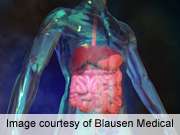Review: SSRI use ups risk of upper GI bleeding

(HealthDay)—Selective serotonin reuptake inhibitor (SSRI) use is associated with increased risk of upper gastrointestinal bleeding (UGIB), according to a meta-analysis published in the January issue of Clinical Gastroenterology and Hepatology.
Hai-Yin Jiang, from Zhejiang University in Hangzhou, China, and colleagues conducted a systematic review and meta-analysis of controlled observational studies to examine whether SSRI use impacts the risk of UGIB. Data were included for 22 studies (six cohort and 16 case-control) involving more than 1,073,000 individuals.
The researchers found that the odds for developing UGIB were 1.55 fold-higher for SSRI users versus patients who had not taken SSRIs. Subgroup analysis indicated that the correlation was strongest for patients who received concurrent therapy with nonsteroidal anti-inflammatory or antiplatelet drugs. Among patients receiving concurrent acid-suppressing drugs, there was no significant increase of developing UGIB.
"SSRI use was associated with an almost two-fold increase in the risk of developing UGIB, especially among patients at high risk for GI bleeding (concurrent use of nonsteroidal anti-inflammatory or antiplatelet drugs)," the authors write. "This risk might be reduced significantly by concomitant use of acid-suppressing drugs."
More information:
Abstract
Full Text (subscription or payment may be required)
Editorial (subscription or payment may be required)
Copyright © 2015 HealthDay. All rights reserved.
















